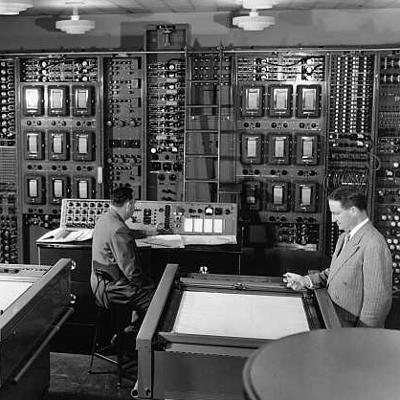 Working in the IT industry means embracing change and the latest technology trends. Doing the same thing day-in and day-out is a luxury we don’t have, and frankly, sounds kind of boring. Since computers were first invented, there’s been a need to service them. Here’s a look at how the IT service industry has changed over the past 50 years.
Working in the IT industry means embracing change and the latest technology trends. Doing the same thing day-in and day-out is a luxury we don’t have, and frankly, sounds kind of boring. Since computers were first invented, there’s been a need to service them. Here’s a look at how the IT service industry has changed over the past 50 years.
1960s & 70s: The Early Years
This was a time when only large companies could afford computers because they were expensive and took up a lot of space. In fact, computing was so costly in these days that businesses would pool together their resources and practice computer “time-sharing.” Time-sharing allowed different businesses and users to interact concurrently through a single computer, which let companies take advantage of computing without having to own and maintain one.
The first generation of IT professionals maintained these time-sharing computers and helped develop new interactive applications. As we will see in the later of part of this article, history repeats itself and the old practice of computer time-sharing looks a lot like cloud computing of today.
1980s: Computers Become Affordable
Thanks to innovations by IBM, Macintosh, and Xerox, the 1980s was a revolutionary time for the IT industry as computers became more affordable for businesses. Three events in particular stand out as the biggest game changers for the IT service industry during this time.
- 1981: IBM launches VisiCalc, one of the first PCs. It had a spreadsheet program that revolutionized accounting and opened up a world of opportunity for CFOs.
- 1984-1986: Small businesses began taking advantage of PCs.
- 1988: IBM launches its PS/2 and 286/386 Revolution models which appeal to more departments than just accounting, thanks in part to the availability of WordPerfect and Lotus 123.
1990s: The Explosion of PC Popularity
The 90s was a time of PC innovation as computers became commonplace at work, in schools and at home, meaning consumers began using their PC for everyday tasks. Windows released popular operating systems and the potential of the Internet was becoming apparent. During the 90’s, IT service companies also expanded into users’ homes and helped educate the public on the many benefits of computers. Here are just a few of the major IT events from the 90s.
- 1990: Memory management becomes easy with Hard disks, and large scale Ethernet rollouts begin.
- 1994: Email is first tried out in the corporate environment using Lotus Organizer.
- 1995: For an IT technician, it’s impossible to think of the year 1995 without first thinking about Windows 95. The way Windows 95 helped make computers easy to use for both consumers and businesses alike truly revolutionized how the world uses computers.
- 1996: PCs are now used as multimedia machines. IT service companies are there to install CD-ROMs, sound and video cards, RAM, and speakers.
- The Late 1990s: Windows 98 and NT take the market share from Novell NetWare, PDAs become popular, consumers adopt email, and BlackBerry Enterprise Server launches.
2000s: The Modern Office Takes Shape
A lot of the technology businesses use today, like Windows XP, Vista, and 7, along with smartphones and video conferencing, were all introduced and began taking shape during this time, and IT service companies helped businesses remotely manage all of their technology and implement BYOD policies. A few tech milestones of the new millennium include:
- 2001: The launch of Windows XP, Microsoft’s most successful OS that’s still the most widely used OS on the market (and slated to lose support in April 2014).
- 2004: Salesforce introduces the first SaaS solution.
- 2006: iPhone launched and virtualization projects become common.
- 2009: Laptops outsell desktops putting BYOD in the spotlight.
- 2010: Windows 7 launches.
Today: It’s all about the Cloud
The IT service providers of today still administer the same great services that they’ve been offering for the past 50 years, with our latest emphasis being to help businesses adopt and become acclimated to the cloud. Cloud computing from Quikteks can save your business money on operating expenses, ensure your data is backed up and safe, and offset the cost of owning and maintaining expensive computer hardware–just like time-sharing in the 1960’s!
To be a part of the history being made by Quikteks, give us a call at PHONENUMBER!

